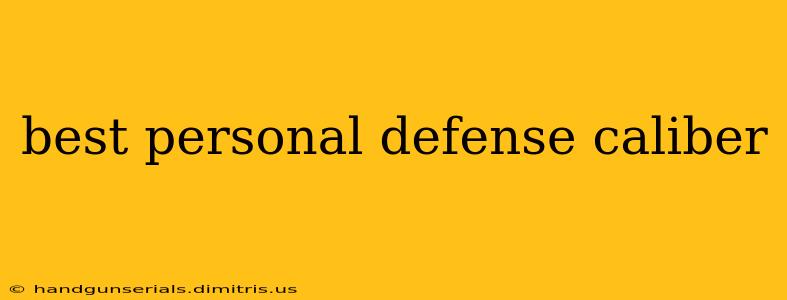Choosing the best personal defense caliber is a crucial decision, impacting your safety and effectiveness in a self-defense situation. It's not a decision to be taken lightly, and there's no single "best" answer that applies to everyone. This guide delves into the factors to consider, exploring popular calibers and helping you make an informed choice based on your individual needs and circumstances.
Factors to Consider When Choosing a Caliber
Before diving into specific calibers, let's examine the key factors that influence the optimal choice for personal defense:
1. Ballistics: Stopping Power and Penetration
-
Stopping Power: This refers to a round's ability to immediately incapacitate an attacker. While often debated, factors like bullet weight, velocity, and expansion contribute to stopping power. Larger calibers generally offer more stopping power, but this isn't the sole determinant.
-
Penetration: The depth a bullet penetrates is critical. Insufficient penetration means the round may not reach vital organs, rendering it ineffective. Excessive penetration poses risks to bystanders. Finding the right balance is essential.
2. Recoil Management: Control and Accuracy
Recoil is the backward force felt after firing. Excessive recoil can affect your ability to accurately place follow-up shots, a critical aspect of self-defense. Smaller calibers generally exhibit less recoil, making them easier to control for less experienced shooters.
3. Ammunition Availability and Cost
The availability and cost of ammunition are practical considerations. Certain calibers are more readily available and affordable than others. Consider the long-term costs associated with practice and maintaining a sufficient supply.
4. Your Physical Capabilities
Your physical strength and shooting experience influence caliber selection. Individuals with less upper body strength might find higher-recoil calibers challenging to manage. Beginners often benefit from starting with lower-recoil options to build proficiency before progressing to more powerful calibers.
Popular Calibers for Personal Defense: A Detailed Look
Several calibers consistently rank highly for personal defense. Let's examine their strengths and weaknesses:
9mm Luger (9x19mm Parabellum)
- Pros: Relatively high capacity magazines, manageable recoil, widely available ammunition, affordable price point, and excellent stopping power when using appropriate ammunition.
- Cons: Can experience over-penetration in certain situations depending on the bullet type.
.45 ACP (11.43x23mm)
- Pros: High stopping power due to its large bullet diameter and mass, excellent for close-range engagements.
- Cons: Significant recoil, lower magazine capacity compared to 9mm, and more expensive ammunition.
.380 ACP (9x17mm)
- Pros: Very manageable recoil, making it ideal for smaller-framed individuals or beginners, relatively lightweight and easy to conceal.
- Cons: Lower stopping power compared to 9mm or .45 ACP, potentially less effective at longer ranges.
.40 S&W (10x22mm)
- Pros: Good balance between stopping power and manageable recoil, good penetration, often preferred by law enforcement.
- Cons: Can be snappy for some shooters, and ammunition may be slightly more expensive than 9mm.
.22 Long Rifle
- Pros: Extremely low recoil, inexpensive ammunition, high capacity magazines, easy to shoot and learn. Excellent for concealed carry and self-defense if proficiency is maintained.
- Cons: The lowest stopping power on this list.
Choosing the Right Caliber for You
The "best" personal defense caliber is subjective and depends on your individual circumstances. Consider the factors discussed above and prioritize the following:
- Your experience and comfort level: Start with a caliber that you can comfortably handle and shoot accurately.
- Your physical capabilities: Choose a caliber that doesn't cause excessive fatigue or discomfort.
- Your intended use: Consider the potential situations you might face and the distances involved.
- Ammunition availability and cost: Ensure you can readily obtain and afford ammunition for practice and self-defense.
Ultimately, the best way to determine the right caliber for you is to try different options at a shooting range, consulting with experienced shooters and professionals to guide your decision. Remember, responsible gun ownership includes proper training and a deep understanding of firearm safety. This information is for educational purposes only and should not be considered legal advice. Always consult with local laws and regulations regarding firearm ownership and usage.

